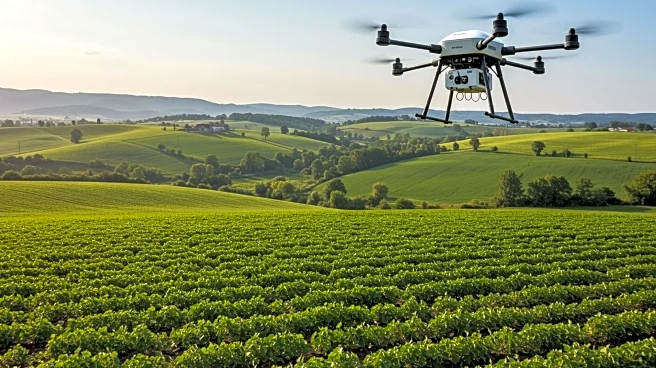What is the story about?
What's Happening?
The integration of artificial intelligence (AI) in agriculture is transforming farming practices, enhancing food security, and promoting sustainability. By utilizing AI-driven systems, satellite imagery, and data analytics, farmers are overcoming traditional challenges and boosting productivity. These technologies enable precision agriculture, allowing for efficient resource management and improved crop yields. AI tools provide farmers with actionable insights on weather trends, pest risks, and market conditions, fostering resilience to climate threats. The democratization of agricultural knowledge through digital platforms is making expert advice accessible to remote and smallholder farmers, further improving resilience and productivity.
Why It's Important?
The adoption of AI in agriculture is crucial for addressing global challenges such as climate change, population growth, and food security. By optimizing resource use and reducing waste, AI-driven practices contribute to environmental sustainability. Farmers benefit from increased efficiency and reduced dependency on labor, which is particularly important in areas facing labor shortages. The ability to predict and manage pest infestations and crop diseases enhances food security by ensuring stable and reliable food production. Additionally, the transparency and traceability provided by blockchain technology in supply chains build trust and quality assurance in the agricultural marketplace.
What's Next?
As AI continues to evolve, its role in agriculture is expected to expand, with further advancements in precision farming and resource management. The integration of AI with satellite technology will provide even more detailed insights into crop health and environmental conditions, allowing for more targeted interventions. The ongoing development of digital platforms will enhance the accessibility of agricultural knowledge, empowering farmers to adopt innovative practices rapidly. Stakeholders, including agribusinesses and government agencies, are likely to invest in AI technologies to drive productivity and sustainability in agriculture.
Beyond the Headlines
The ethical implications of AI in agriculture include concerns about data privacy and the potential for increased dependency on technology. There is also a cultural shift as traditional farming practices are replaced by technology-driven methods, which may affect rural communities' way of life. Long-term, AI's role in agriculture could lead to significant changes in employment patterns, with a potential reduction in manual labor jobs and an increase in demand for tech-savvy workers.

















